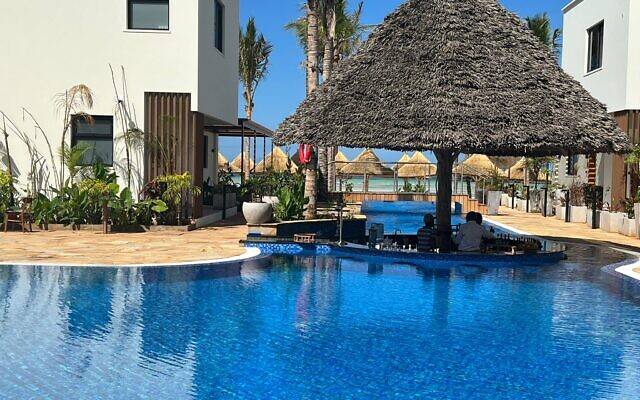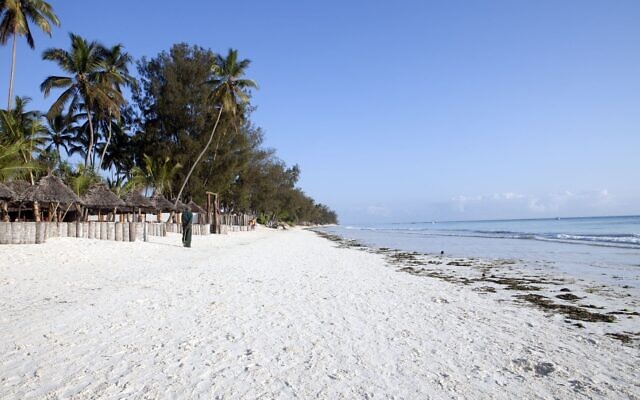With COVID travel restrictions falling by the wayside, Israeli tourists are heading back to the tropical island of Zanzibar. But alongside the sun worshipers are a new type of visitor — Israeli investors.
A few years ago, Zanzibar reported thousands of Israelis visiting a month, with only Germany, Italy, the UK and US sending more people to the Tanzanian island. Those numbers began to fall off in 2019, according to official statistics on arrivals collected by Zanzibar’s semi-autonomous government, and by the time the coronavirus pandemic began to shut down airports only a few hundred were making the trip each month.
The pace of arrivals from Israel has now begun to rebound, albeit at a fraction of what it once was. In March of this year, the last month statistics are available, 171 Israelis visited Zanzibar, up from 83 in March the year before, but well below the 1,980 that visited in March 2017.
With tourists from other countries heading back as well in even greater numbersan Israeli investment group is looking to cash in on the potential sun-kissed tourism magnet by shifting a substantial part of its $500 million portfolio into hotels and resorts on the island.
“We see potential there for large numbers of tourists – and that is also the government’s ambition,” Matan Pertman, who runs RM Group together with fellow co-CEO Ran Harel, told The Times of Israel.
According to Pertman, over three-quarters of Zanzibar’s economy is based on tourism, but it lacks the offerings to make it into a world-class destination.
“The rooms currently available aren’t great and it needs to upgrade to compete with places like the Seychelles and Thailand. As well as hotels, it’s lacking in tourist infrastructure like restaurants,” he said.

A holiday resort in Zanzibar, August 2022 (RM Group)
RM Group has spent the last decade seeking out underpriced real estate assets in the US and Greece and developing them into cash cows. The company’s research and analysis suggests that Zanzibar is the next wellspring of untapped potential, and could soon be a top tourist destination.
Located 23 miles off the African coast, Zanzibar is highly dependent on attracting international tourists to its white sandy beaches. Reaching Unguja, the main island of the Zanzibar archipelago, is relatively simple by plane or ferry from Dar es-Salaam, Tanzania’s largest city, or even directly from Istanbul, Dubai or a few other international locations with flights to Zanzibar’s small airport.
The island is often promoted as a prime spot for rest and relaxation after climbing Mount Kilimanjaro, the world’s highest free-standing mountain; going on safari in Serengeti National Parkhome to over 2 million ungulates, 4,000 lions, 1,000 leopard, 550 cheetahs, and 500 bird species; or other adventurous exploits.

A lion seen drinking from a puddle in Serengeti, Tanzania. (Haim Shohat/Flash90)
“South Africa is the vegetarian version; Tanzania offers the real thing in terms of safari, and then there is Zanzibar for three or four days of true tropical relaxation,” said Shlomo Carmel, whose Another World tour company specializes in bringing Israelis to the region.
Official government figures show the island offers just over 600,000 hotel rooms. In 2019, nearly 540,000 foreign tourists visited the island, most staying for six to eight nights.
To help make up for what it says is a shortage of rooms, RM Group is putting money into new hotels and resort complexes in the beach towns of Pongwe, Kiwengwa, Nungwi and elsewhere, much of it with Israeli money under the fund’s management. It has already worked on an 84-room four-star resort. Also in the pipeline are a further 450 rooms in Zanzibar, delivered in partnership with local businesses and tourist authorities, as many of its projects are.
Among the upgrades its hotels are bringing to the local tourist scene is air conditioning, something many hotels rooms there have lacked in the past.
Carmel says business has picked up since the pandemic ended, and he believes that several thousand Israeli tourists will ultimately visit Tanzania this year.
He is not the only one that sees an influx on the horizon. A local Chabad housewhich caters to Israeli and Jewish tourists on Zanzibar (there is no native Jewish community) reopened late last year after closing during the pandemic and is planning to invest in a kosher restaurant there. And the government has made clear it is eager to promote an Israeli return to Tanzania post COVID.

RM Investment Group founders, Matan Pertman and Ran Harel
Back in 2016, 15,000 Israeli tourists a year visited Tanzania, and before the pandemic, Israel was the sixth most important source of tourists for the country.
A relatively stable democracy with a constitution and solid legal framework, and without the ethnic divisions that plague some of its neighbors, Tanzania can be an attractive draw for investors looking to Africa.
The government encourages and supports foreign investment in real estateoffering both incentives and assistance.
“We see an exceptional real estate development opportunity for our investors and for us,” said Pertman.

This October 12, 2010 photo shows a villager walking along a deserted beach at Kiwengwa Strand Hotel Villagi Bravo, a seaside resort on the East African archipelago of Zanzibar. (AP/Rodrique Ngowi)
Tanzania has a relatively developed financial and investment framework, with low inflation (4.2%), a stable exchange rate, and what it claims is a streamlined investment process with a one-stop facilitation agency for businesses looking to invest.
It is also possible for foreign businesses operating in Tanzania to get credit from domestic financial institutions to leverage their investment effectively. In real estate, that is an important consideration.
Collaborations between Israel and Tanzania in the past have mainly focused on agriculture, helping Tanzanians improve sugarcane production more than fivefold and bringing hundreds of students to study in Israel. The countries have not always seen eye-to-eye on the world stage, but in recent years Jerusalem has focused more attention on sub-Saharan Africa, forging new relationships and expanding its diplomatic footprint where it can, often in exchange for friendlier votes at the United Nations where Tanzania has been known to go against the crowd and vote in support of Israeldespite having a majority Muslim population.
In May, Yair Lapid, who is today prime minister but then was foreign minister, told the 2022 Africa-Israel Conferencethat “Israel is back in Africa.”
“That is not a slogan. It is a diplomatic, economic, and social reality… Today, Israel understands the power of Africa. And Africa understands that Israel is a force for good: We are working together in the spirit of partnership and cooperation, and harnessing our expertise, experience, and technology toward addressing shared challenges.”